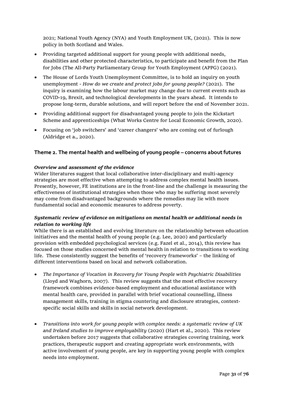
Page 31 of 76
2021; National Youth Agency (NYA) and Youth Employment UK, (2021). This is now
policy in both Scotland and Wales.
• Providing targeted additional support for young people with additional needs,
disabilities and other protected characteristics, to participate and benefit from the Plan
for Jobs (The All-Party Parliamentary Group for Youth Employment (APPG) (2021).
• The House of Lords Youth Unemployment Committee, is to hold an inquiry on youth
unemployment - How do we create and protect jobs for young people? (2021). The
inquiry is examining how the labour market may change due to current events such as
COVID-19, Brexit, and technological developments in the years ahead. It intends to
propose long-term, durable solutions, and will report before the end of November 2021.
• Providing additional support for disadvantaged young people to join the Kickstart
Scheme and apprenticeships (What Works Centre for Local Economic Growth, 2020).
• Focusing on 'job switchers' and 'career changers' who are coming out of furlough
(Aldridge et a., 2020).
Theme 2. The mental health and wellbeing of young people - concerns about futures
Overview and assessment of the evidence
Wider literatures suggest that local collaborative inter-disciplinary and multi-agency
strategies are most effective when attempting to address complex mental health issues.
Presently, however, FE institutions are in the front-line and the challenge is measuring the
effectiveness of institutional strategies when those who may be suffering most severely
may come from disadvantaged backgrounds where the remedies may lie with more
fundamental social and economic measures to address poverty.
Systematic review of evidence on mitigations on mental health or additional needs in
relation to working life
While there is an established and evolving literature on the relationship between education
initiatives and the mental health of young people (e.g. Lee, 2020) and particularly
provision with embedded psychological services (e.g. Fazel et al., 2014), this review has
focused on those studies concerned with mental health in relation to transitions to working
life. These consistently suggest the benefits of 'recovery frameworks' - the linking of
different interventions based on local and network collaboration.
• The Importance of Vocation in Recovery for Young People with Psychiatric Disabilities
(Lloyd and Waghorn, 2007). This review suggests that the most effective recovery
framework combines evidence-based employment and educational assistance with
mental health care, provided in parallel with brief vocational counselling, illness
management skills, training in stigma countering and disclosure strategies, contextspecific
social skills and skills in social network development.
• Transitions into work for young people with complex needs: a systematic review of UK
and Ireland studies to improve employability (2020) (Hart et al., 2020). This review
undertaken before 2017 suggests that collaborative strategies covering training, work
practices, therapeutic support and creating appropriate work environments, with
active involvement of young people, are key in supporting young people with complex
needs into employment.